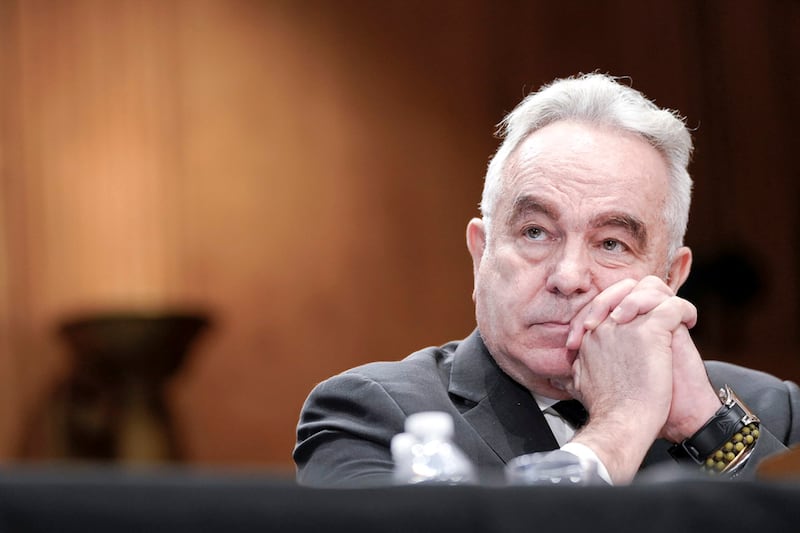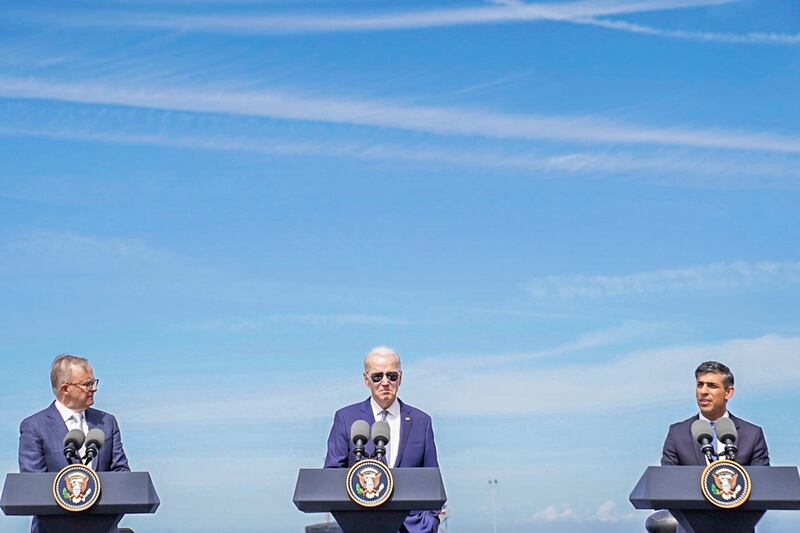The United States will find a way to provide the nuclear-powered submarines promised to Australia as part of the AUKUS security pact despite the massive backlogs plaguing American shipbuilding yards, Deputy U.S. Secretary of State Kurt Campbell said Wednesday.
Campbell, who recently departed a role as President Joe Biden's "Asia czar" to become the second-most senior U.S. diplomat, said it was "fair to say" American submarine production is hampered, but added that there was already a "substantial focus" on the issue at the Pentagon.
Supply-chain issues have hamstrung production at American shipyards, but the billions of dollars of investments made by Canberra in the shipbuilding industry was helping fix that, he explained.
"As is always the case, more money helps," Campbell said at an event at the Center for a New American Security held to mark a year since the AUKUS submarine deal was unveiled. "AUKUS, in many respects, is a game changer. It is basically finding the way forward."

Campbell acknowledged the injection of Australian funds – though “very generous” – would not be enough on its own, and that “new investments” and “new capabilities” would be needed “to increase our ability both to service and also produce submarines.”
“Backlogs and bottlenecks have plagued a number of programs,” he said. “There is a very serious endeavor underway to see what steps can be taken to not only to assist a program like AUKUS but, frankly, certain munitions which are central to American military purpose.”
Australia has earmarked a total of AU$368 billion, or about US$245 billion, over the next 30 years as part of the AUKUS pact, which is aimed at countering China's expansionism in the Indo-Pacific.
AUKUS pact
Australia, the United Kingdom and the United States unveiled the deal in March last year for the latter two nations to arm Australia with nuclear submarines over the coming decades under AUKUS.
As part of that, the United States committed to selling between three and five Virginia-class nuclear submarines, which use conventional weapons, to Canberra over the next decade in exchange for some US$3 billion of Australian investment in American shipyards.
But concerns have emerged in Australia that the United States may not be able to provide the submarines due to backlogs. Meanwhile, U.S. lawmakers, such as Sen. Bill Hagerty, a Republican from Tennessee, have pondered if the United States has submarines to spare.

A U.S. defense spending bill signed last month also cut funding for production of a Virginia-class sub, with Rep. Joe Courtney, a Democrat from Connecticut who co-chairs the AUKUS Working Group, saying the move could undercut plans to provide submarines to Australia.
"One of the big questions with AUKUS was: Will it provide enough submarines to keep the US fleet at an adequate level and will it produce enough submarines to satisfy the three boats that we agreed to sell?" the lawmaker told Australia's Sydney Morning Herald.
Australian and U.S. officials, though, have maintained the submarines will be provided by the early 2030s, by which time Australia expects to begin producing its own submarines with British help.
Multilateralism
During Wednesday’s event, Campbell also flagged the possibility of Japan and the Philippines joining AUKUS in some capacity, with Japanese Prime Minister Fumio Kishida and Philippines President Ferdinand Marcos, Jr. visiting the White House on April 11.
“It is true that there are other countries that have expressed an interest to participate, under the right circumstances,” he said. “I think you'll hear that we have something to say about that next week.”
The No. 2 American diplomat said it was all part of a push by the United States to shift its Indo-Pacific alliances in a more multilateral direction, and away from a series of bilateral relationships.
“It used to be that we had this ‘hub and spoke’ set of relationships between the United States and allies and partners,” Campbell said. “Now we're creating … a ‘lattice-fence’ arrangement, with lots of intertwined, overlapping, interlocking engagements.”
Edited by Malcolm Foster.
